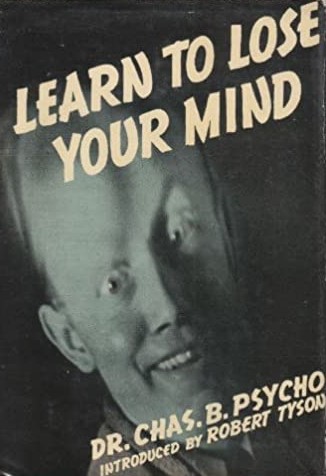 By DR. CHAS. B. PSYCHO (Farrar & Rinehart; 1937)
By DR. CHAS. B. PSYCHO (Farrar & Rinehart; 1937)
1930s humor books, which include THE HUSSY’S HANDBOOK, YOU CAN’T TAKE IT WITH YOU and BEDS (written by none other than Groucho Marx), are a genre unto themselves. Such books, needless to say, tend not to be as funny as they once were, with cultural references that have long since been lost to time and attitudes that would be deemed politically incorrect by modern standards (just look at THE HUSSY’S HANDBOOK’s chapter headings, which include “Latins are Lousy Lovers” and “I’ve Got the South in My Mouth”).
The 1937 tome LEARN TO LOSE YOUR MIND, a parody of the self-help manuals that proliferated in the 1930s (as they continue to today), asserts “It’s smart to be psychotic” and purports to demonstrate “how to profit by your mental quirks.” The credited author is Dr. Chas. B. Psycho (actually Robert Tyson), a self-described doctor-turned world explorer-turned psychiatrist whose dedication is “TO MYSELF Whose Patience, Persistence and Intelligent Cooperation Have Made This Book Possible.”
The opening chapter describes Psycho’s absurdly wide-ranging existence, incorporating the pulp fiction of the era, the early twentieth century mania for the exploration of “savage” lands and the rags-to-riches narratives popularized by Horatio Algier. Subsequent chapters contain info on how to “Make a Million—Quick—Without Thinking!,” “How To How To” and “Assorted Mental Miracles.”
The most outrageous chapter is “No Job Too Small or Big for Psycho,” in which Dr. Psycho describes a cure for dandruff that involves removing a patient’s organs “as well as a technical innovation involving a mild decapitation” until “I can add with considerable satisfaction that there was left no single sign or trace of the original dandruff.” The all-around best—i.e. funniest—chapter is “Troubles are Bubbles,” which takes direct aim at psychiatric case studies in absurd queries like “When on a boat disappearing beneath the water, do you have a sinking feeling?” and observations like the “flash of insight” Psycho experiences while counseling a patient who complains of feeling misunderstood, leading Psycho to inquire “Why not learn English?”
Yes, the humor here tends toward the unacceptable-by-modern-standards end of the spectrum (as in the references to “Dat Ole Debbil Unconscious”). It’s also broad and nonsensical, as in the chapter “Hot and Cold Running Wisdom,” a scattershot collection of silly tidbits that can be skimmed without missing anything of import.
Ultimately this book is probably best summed up by the author himself, who reveals the “devastating secret that cannot fail to bring success,” unveiled in the final chapter: “Sell thousands, ever so many thousands, of copies of a book with a catchy title that promises more than anyone with a grain of sense could possibly expect.”
